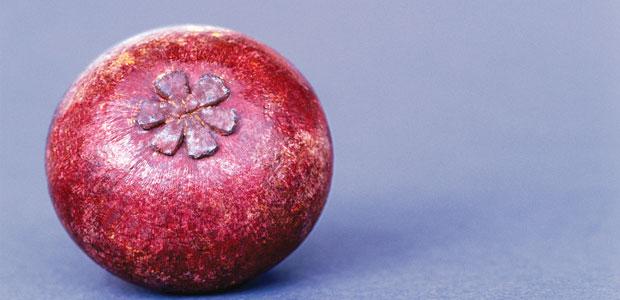Advertisement
Squeeze More Variety Into Your Glass
Remember when picking up juice at the grocery store meant orange or grapefruit? Now you can enjoy the health benefits of Polynesian noni juice or Tibetan gogi (goji) juice. Interest in the exotic is nothing new; it’s how potatoes and tomatoes made their way from South America to Europe. A little closer to home, we … Continued

Remember when picking up juice at the grocery store meant orange or grapefruit? Now you can enjoy the health benefits of Polynesian noni juice or Tibetan gogi (goji) juice. Interest in the exotic is nothing new; it’s how potatoes and tomatoes made their way from South America to Europe.
A little closer to home, we find that three of the healthiest fruits in the world are grown right here in North America: pomegranate, cranberry, and tart cherry.
How healthy are these juices? Pomegranate juice has potential for amazing benefits for those suffering from cardiovascular conditions such as arteriosclerosis, high blood pressure, and elevated cholesterol. Cranberries, traditionally used to treat urinary tract infections, are packed with antioxidants and may prevent stomach ulcers. Tart cherries contain compounds that reduce inflammation and pain, a fact that supports their folk-remedy status for gout and arthritis. They may even help you get a better night’s sleep.
Pomegranate Promotes Better Circulation
Pomegranate juice (PJ) contains an array of antioxidants including polyphenols, tannins, and anthocyanins. The primary active ingredient is a group of polyphenol compounds called punicalagins. Several well-controlled human studies conducted in the US, Asia, and Israel have shown consistent cardiovascular benefits for those drinking PJ over periods ranging from two weeks to three years.
Benefits include a significant decrease in total and LDL cholesterol levels, decreased LDL/HDL cholesterol ratios, and an increase in the activity of paraoxanase, an enzyme critical to proper cholesterol metabolism.
A three-year study found that subjects who consumed 50 mL per day of PJ demonstrated reduced evidence of cardiovascular disease with a 21 percent decrease in systolic blood pressure after one year, compared to the control group. A second study by the same researchers found that PJ consumption resulted in a reduction of up to 36 percent in angiotensin-converting enzyme, the primary blood pressure regulating enzyme, with a 5 percent reduction in systolic blood pressure after only two weeks.
Cranberries Give H. Pylori the Boot
Cranberry juice is widely used to prevent urinary tract infections (UTI). Proanthocyanidins, naturally occurring antioxidant compounds present in cranberry juice, prevent bacteria from sticking to the lining (epithelial cells) of the urinary tract. Studies have shown that drinking approximately 50 mL of pure cranberry twice daily is effective.
A study published in the Journal of the American Dental Association (1998) reported that cranberry juice also has the ability to reverse and inhibit the formation of dental plaque. Plaque is a major cause of periodontal disease.
Preliminary studies indicate that cranberry juice may inhibit Helicobacter pylori infections, a common bacterial infection of the stomach lining and a leading cause of stomach ulcers. H. pylori is also linked to stomach cancer and acid reflux disease.
Tart Cherry–a Natural Sleep Aid
Researchers at the University of Michigan have discovered that tart cherries (not sour or black), specifically the Montmorency variety, contain highly active compounds that reduce both pain and inflammation as much as or more effectively than some common anti-inflammatories and painkillers.
Dr. Russel Reiter of the University of Texas is also looking into the potential benefits of tart cherries as a sleep aid. Tart cherries are a significant natural source of the sleep hormone melatonin. This has led to the suggestion that tart cherry juice consumption might not only reduce pain and inflammation associated with gout and arthritis but also promote better sleep patterns in older individuals.
Invest in the Best
Fruit juice is best purchased in glass containers because packaging in glass eliminates concerns regarding contaminants leaching from plastic containers. Avoid fruit nectars and cocktails; they contain only about 10 to 35 percent pure juice and usually a lot more sugar. Purchase only 100-percent pure cranberry, tart cherry, and pomegranate juice. Standardized extracts are also available.
Health food and nutrition stores, as well as some farmers markets, co-ops, and ethnic food stores, are your best bet for pure juice.




